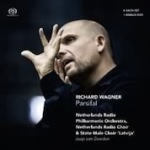Remember when recordings of Parsifal were rare? There were a handful of Knas, then Solti, Barenboim, Karajan, and Kubelik. Now every Tom, Dick, Gergiev, and Zweden are throwing their hats into the ring. Gergiev’s, released last year, was stunning–full of both anguish and ecstasy–and for the most part was very well cast, with an outstanding René Pape as Gurnemanz. This new set, from Challenge Classics, a concert performance from the Concertgebouw in Amsterdam recorded in December, 2010, is one to reckon with as well, but in a very different way and with one central problem.
It’s obvious that conductor Jaap van Zweden has consciously opted to play down the story’s pomp and stress the piety. He does not make the climaxes swell in a way that reach the theatricality that Gergiev and Kubelik bring to the opera. It is not a lack of impetus that causes this; his tempos are wisely judged, on the quick side (the whole opera takes about four hours and five minutes), and each scene melds properly into the next. We get playing of amazing warmth–a soothing bath of sound that implies godliness, devotion, and tranquility. The choirs are otherworldly and the orchestra plays beautifully.
This Parsifal never gets too loud; it may just be the most lyrically spotless, smoothest reading the opera has ever had. String playing shimmers at all times and the winds breathe. The Transformation and Grail Hall scenes are given gravity by their weight and noticeably slower tempos rather than by the Godunov-like bells we normally hear: you practically feel the weariness; you fear the exhaustion of the repetition of the Rite.
This more intimate approach, if it can be called that, is clear in Zweden’s choice for the title role. I was crazy about Klaus Florian Vogt’s Lohengrin (on Opus Arte video, under Kent Nagano) even though he had, I thought, a Tamino voice. But Lohengrin is not Parsifal, where phrasing and simple beauty can make up for stature. So light is his tone that his entrance in the first act goes virtually unnoticed; suddenly it sounded as if one of the knights or squires was singing Parsifal’s music. I assumed he would eventually put more weight into the voice as Parsifal the innocent became Parsifal the knowing–perhaps at the situation-changing Kiss in Act 2–but I was wrong.
He sounds overwhelmed by Kundry in Act 2 and, sorry to say, almost silly at the opera’s close, where suddenly some kid becomes a leader. It seems almost arbitrary. Not everyone has to be Vickers, but neither Jerusalem nor Kollo had large voices and they still have the desired effect. Vogt’s tone and phrasing may be lovely, musical, and intelligent but they aren’t right for Parsifal.
The Gurnemanz of Robert Holl, heavier and older-sounding than Pape’s for Gergiev, is a wonder of wisdom and insights; he breathes the role in a long arc and we hang on his every utterance. He’s entirely persuasive and doesn’t sound as if he’s trying. Katarina Dalayman goes from truly seductive to crazy-wild in Act 2; her Kundry is a towering performance. Falk Struckmann’s Amfortas is a truly damaged soul, his anguish the work of a truly great singing actor. I’m not certain about Ante Jerkunica’s Titurel; it seems a bit youngish-sounding to me. The closest Zweden comes to whipping the orchestra into a frenzy is at the opening of Act 2–no piety here–but Krister St. Hill does not reach the evil, loony heights of the best Klingsors. The Flower Maidens, singing at quite a clip, sound wonderful.
And so this is almost an alternate view of Parsifal–not exactly light (that would be impossible), but reserved and dutiful. The sound is similarly warm and spacious. For sheer beauty it is miraculous, but there is no way to explain a Parsifal with such little vocal heft or depth, regardless of artistry.
The boxed set, with German-only libretto, includes an 81-minute DVD of excerpts from the concert performance. It’s a good bonus. But to hear the opera with its desired effect, the Kubelik is still a first choice unless you’re devoted to Kna’s 1962 Philips recording, with Hotter as Gurnemanz, Neidlinger as a terrifying Klingsor, and Jess Thomas in the title role.[10/10/2011]
































